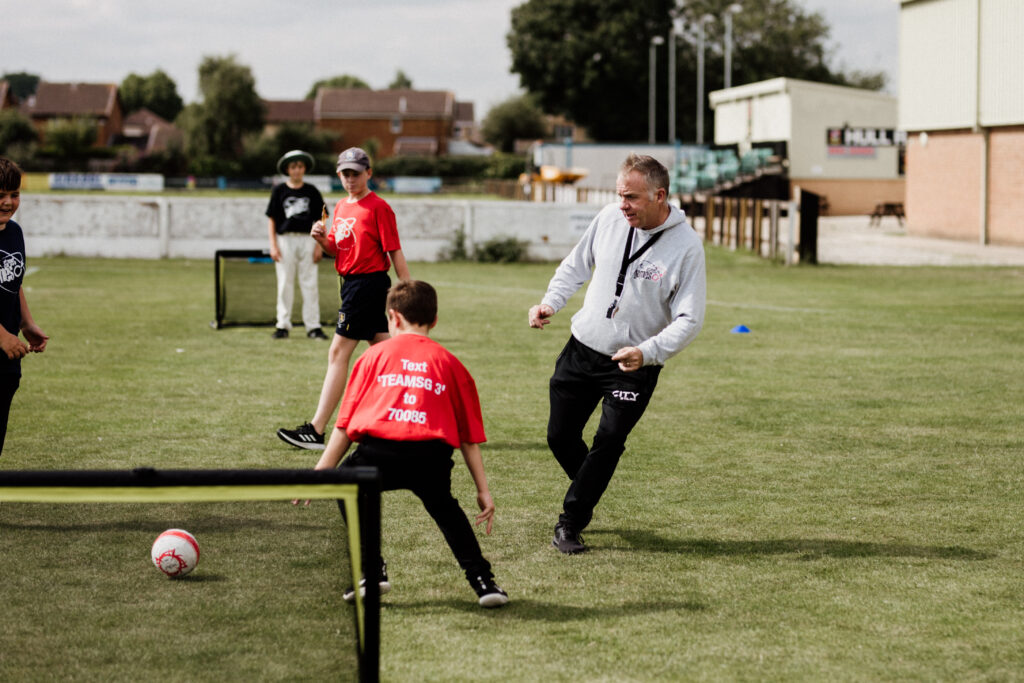
Written by Matthew Pilkington, Director of Fundraising and Communications
StreetGames is celebrating a landmark milestone in the support it provides to local organisations as we smashed through the £20m barrier raised for local delivery in late 2022. The figure now stands at £23.8m raised with and for Locally Trusted Organisations (LTOs) to implement Doorstep Sport in underserved communities since 2018.
It’s a fantastic achievement in its own right, and one we’re very proud of. But more than that, it’s a vindication of StreetGames’ approach to sustainability and our work helping LTOs to build for the long term.
Back in 2017, through our work with the national network of LTOs, StreetGames had identified a gap in the support that LTOs could access. These organisations, so vital to the well-being of their neighbourhoods and delivering diverse outcomes for communities and young people, were not accessing the full range of funding opportunities available to them. This barrier to funding was holding LTOs back from fulfilling their full potential.
So in July 2018, with support from Sport England, StreetGames put in place a regional infrastructure across England which included specialist sustainability support. The idea was that these regional Sustainability Leads would work with LTOs to identify, access and secure funding wherever it was available. This would be supplementary to the fundraising and partnership work that StreetGames was already doing at a local and national level. It is fair to say that there was no certainty that the model would work and we are grateful that Sport England and, later, Sport Wales too, were willing to go on the journey with us as we navigated the landscape with the goal of connecting LTOs to as much resource as possible to continue their work.
Reaching the £20m landmark is therefore a huge achievement and one that we at StreetGames are immensely proud of.
All of the £23.8m raised over the last five and a half years has paid for Doorstep Sport on the ground for young people with little or no disposable income, living in the most underserved communities. The young people that Doorstep Sport activates are often the same young people that are furthest away from the traditional sports sector, even at the grassroots level. Nearly 70% of participants in Doorstep Sport don’t access any other sport outside of the school or college curriculum.
While this gives us a moment to celebrate, it also gives us a moment to reflect on some of what we have learned on the journey. Our top three lessons from this approach:
1. Some of the detail that lies beneath the headline number is really interesting and informative. Over 90% of the funding that has been accessed has come from ‘non-sport’ sources: funding and resources that were not initially earmarked to be spent on sport. In many ways this is a vital part of the success story; it shows that a whole range of funders are recognising the value of sport, particularly Doorstep Sport, in helping them reach the right audience and achieve outcomes across areas as diverse as mental health and wellbeing, youth empowerment and skills development, crime prevention and community safety and community cohesion. The recognition of sport by diverse funders as a meaningful and impactful route to reaching and engaging young people is to be celebrated.
Whilst this is a success for the role of sport across the wide spectrum of policy outcomes it also raises a question. Is the world of sport and sports funders doing enough to to recognise and support a vital part of its own infrastructure? Many LTOs work with some of the least active groups of young people to build their sporting know-how and confidence and are a vital part of developing sporting habits for the future. Many of those young people will go on to access the more traditional sports sector, others will go on to support future generations through sport in their neighbourhoods. Sport as a sector can do far more to value and support the sporting foundations that LTOs are building; often they are the only people in their communities who are doing it. The recent Chiles Webster Batson Commission found much the same.
2. It has become a sector truism that training and the development of fundraising expertise is what organisations like LTOs need. If they can just learn to fill in the forms better and compete more effectively with the small organisations in the next borough then they’d be alright. The reality is that the people running LTOs are some of the best, most skilled fundraisers around. The environment within which they operate dictates that they have to be and many would not exist to do their vital work if they hadn’t developed these skills. Training and skills development forms part of the picture but LTOs can often be inundated with offers of training of varying quality and relevance.
What LTOs really need is time and capacity, and that is often the role our sustainability team plays, providing the extra capacity needed to scope opportunities, identify where they might connect to the work of LTOs and then putting pen to paper alongside these organisations to get an application over the line. Where StreetGames have not been able to provide this support, there is often nowhere else LTOs can access it. Demand for support outstrips supply, the demands on the time of LTOs outstrips their capacity.
The sustainability support model works, StreetGames committed to an increase in capacity in 2021 but there is still so much more that we can do. Sustainability support doesn’t always have to be provided by StreetGames but LTOs need to be able to access it from somewhere that understands the context within which they are working.
3. Locally Trusted Organisations, by their very definition, are trusted by the communities in which they operate to make positive change happen. Their leaders and volunteers are the local role-models that young people can look up to and emulate. They offer local young people somewhere to go, something to do and someone to trust. They understand what is needed and what works in their neighbourhoods.
Many of these organisations are piecing together their existence by piling up programmes of delivery, living hand-to-mouth on desperately needed funding that so often comes with multiple targets and delivery expectations.
A relaxation in the funding restrictions that governs the lives of LTOs would aid their sustainability no end and demonstrate that they are as trusted by the funders that support them as they are by the communities they support. Funding that enables LTOs to meet their core running and staff costs as well as delivering within their community feels like the holy grail for many operating in this environment. More funders should consider working with LTOs in this way.
With so many young people still left without access to sport and physical activity in their neighbourhoods, the role of LTOs has never been more important. StreetGames will continue to stand shoulder to shoulder with these vital organisations to help secure their future, and the future of the young people they support day in and day out. Our sustainability approach shows that with the right tools, great community organisations can build the skills and capacity they need to thrive, but there is still more to do on the part of funders to make it easier to get funds to the places they are needed most.

